MLIKI
HE WORLD FIRST HYBRID MARKETPLACE
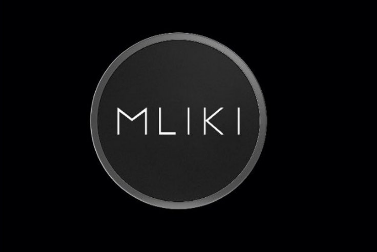
ABSTRACT
The fast advancement of technology has prompted many individuals and businesses to reconsider their business strategies. Digitalization in business is a big part of a lot of them. New methods to communicate, cooperate, sell, connect, and streamline transactions have emerged as a result of digitalization.
Conventional commerce is becoming unpopular as digitalization increases efficiency, easy access, marketing, productivity, promotion, and communication. eCommerce used to be a solitary experience with no social or emotional appeal, entirely at odds with what most purchasers want and expect from a purchasing experience.
Shopping is often a social activity. Customers prefer to buy with friends and family and share their experiences and opinions with their peers. When customers transact online, they anticipate a comparable social experience. Social Commerce was born out of shoppers’ desire to learn more about a product from their friends or relatives before purchasing it. Social Commerce is a relatively recent phenomenon that has swept the e-commerce industry.
Unlike many other technologies that have come and gone over the years, Social Commerce has taken off quickly. Social Commerce has taken word-of-mouth where it never really existed before, the online shopping world. People may now shop and compare prices to obtain better offers.
Retailers benefit from Social Commerce since it allows them to reach a broader audience through collaborative shopping. Many companies have been able to adopt this subset of ecommerce; however, there is the issue of security, site crash, and platform differentiation.
Users can’t purchase physical goods on the same platform where digital goods purchasing such as NFT, Metaverse NFT items are sold.
Mliki aims to solve this problem by introducing a hybrid marketplace. It aims to shift the dynamic by using blockchain to create a platform that makes it possible to purchase physical items and digital goods like NFTs on it.
Introduction
Mliki is a limitless digital items and physical goods marketplace. Mliki aims to create hybrid marketplace that makes it possible to purchase physical goods and digital item like NFTs at the touch of a finger.
Social commerce has risen to prominence as the new impulse aisle and, in some cases, the new shopping mall. Untangling the degree of fragmentation in retail marketing remains the largest and most pressing impediment to Social Commerce’s success. Various choices are available when it comes to channels: D2C sites, e-commerce, and physical storefronts. While this broadens the diversity for the end user, it does not add to organizational agility or effect.
Many firms, large and small, already have an omni-channel setup in place. Still, it’s isolated and doesn’t prioritize integration. This necessitates additional personnel and raises prices. When purchasing products, there are a few things to keep in mind, both existing customers and prospects want a seamless experience, preferably in a single session with few diversions.
This is why we believe hybrid marketplace can fill this void and address fragmentation issues and platform differentiation by meeting time-sensitive customer expectations and bridging the gap between physical and digital items
PRODUCT
Social Commerce
The term “Social Commerce” refers to a subset of e-commerce and, more broadly, retail. It’s the progression of social media as it relates to shopping. Social Commerce involves leveraging social media and social interactions to help promote the buying and selling of products and services online. Businesses and individuals are now shifting their online marketing approach and allocating funds to leverage Social Commerce to increase sales and brand awareness.
How does Social Commerce work?
Social Commerce can be driven by either social media platforms or e-Commerce sites. Customers can encounter a product via a brand or influencer’s page on social media platforms or encounter a brand via advertisements on platforms such as Instagram Stories.
They can also compare items when they visit a product catalog or brand website and make their purchase straight on the platform. On e-Commerce sites, brands may list their products through official stores or resellers. Products may also appear through the site’s product feed when customers search for relevant keywords.
Likewise, consumers can compare prices between similar items or view multiple products through the brand’s catalog and complete their purchase directly through the platform. e-Commerce sites often utilize social elements such as chat functions, buyer reviews, and video feeds to encourage more significant interaction between users and brands
What is the significance of Social Commerce for brands?
Social media has become an enormously essential source of product research and information for consumers in this generation. According to GlobalWebIndex, 42 percent of social media users utilize social media to learn about product prices and quality.
This pattern has resulted in a rise in Social Commerce sales throughout the region. According to Euromonitor analysis, in Asia Pacific (APAC), Social Commerce sales topped USD 2 trillion in 2019 and are predicted to treble by 2024. Brands who grasp the potential of Social Commerce are increasingly incorporating it into their overall marketing strategy, particularly when it comes to driving top-of-funnel brand awareness to purchases.
40 percent of consumers are motivated to buy a product they did not want because of social connections, such as interactions with Key Opinion Leaders (KOLs), usergenerated content (UGC), live-streaming, referral marketing, and product reviews from inside their existing social circles. This is especially true in markets like China, where Social Commerce has solidified itself as an important part of the country’s fiercely competitive retail landscape.
Due to the widespread use of social media and digital payment methods and the country’s acceptance of e-commerce, Chinese customers are particularly responsive to Social Commerce. In China, almost 55% of consumers buy goods or services directly through social networking apps. We are on track to become the largest consumer generation in decades, spending twice to three times as much time directly shopping on social networking platforms as the average consumer.
China, as a Social Commerce pioneer, is projected to be the model for the expansion of Social Commerce in other nations across the region, with its Social Commerce gross merchandise value (GMV) expected to hit CNY 2.86 trillion in 2021.
PROBLEMS
Conventional Social Commerce
The Social Commerce and e-Commerce landscapes will continue to expand in 2022, with online sales of commodities – particularly groceries and pharmaceuticals – soaring as a result of the ongoing global Coronavirus (COVID-19) pandemic. As a result, online and Social Commerce services have expanded to include contactless and even robotbased deliveries, while traditional brick-and-mortar stores, restaurants, and homebased businesses have increased their online and social media presence.
Unfortunately, the explosion of demand for social commerce services still has major problems such as the following :
- Security Online portals are in the headlines a lot because of security breaches from hackers. It’s a major problem because your account could be hacked and your funds wiped out if you’re not careful. eCommerce sites have to face this harsh reality, and no website can guarantee that the financial information on its portal will not be hacked.
- Site crash Site crash Social Commerce is completely reliant on internet access. A major disadvantage of e-commerce is the inability to make purchases due to a site crash. Such a minor word site collapse can bring down an entire corporation in a matter of seconds. This can happen if your bandwidth connection is poor, since you will have major problems loading pages and placing orders. If the site you’re looking at goes down, you won’t be able to make a purchase.
- Fear People are afraid of the unknown. The majority of e-commerce transactions are faceless and paperless, with no required verification. Customers are apprehensive to make card payments in advance because most firms do not have a physical presence
- Payment Fraud Since most online shopping are paid with credit or debit cards, card frauds are common. Although website owners take every effort to protect card information, but is it really safe from hackers? It’s an increasing issue as we hear more and more about data breaches. Customers will lose faith in online portals if suitable blockers are not in place, and they will cease making online payments.
- Platform differentiation There is a differentiation between platforms where you can get physical items and digital goods like NFTs. Customers can’t get all they want in a particular platform without the headache of navigating between one platform and another. Not all products are accessible.
- High Prices Customers are burdened with shouldering the delivery cost that comes with shopping online alone. They have to pay for the product and the cost of bringing it to them. This results in higher prices than they bargained for.
By using blockchain technology, Mliki aims to create hybrid marketplace by combines social commerce and blockchain tehnology. The platform allows its user to purchase physical items and digital goods like NFTs.
SOLUTIONS
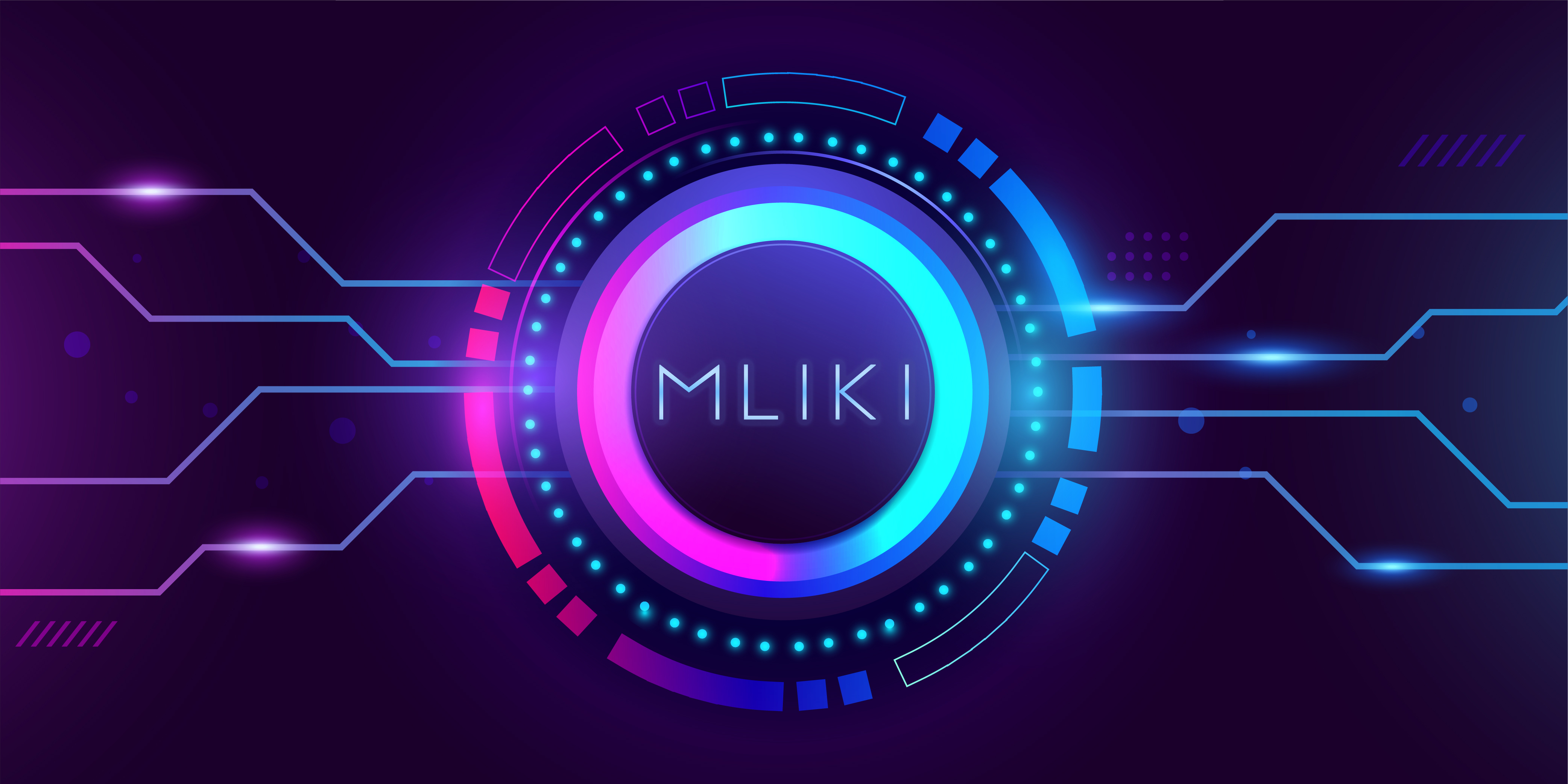
Mliki Hybrid Marketplace
Mliki offers a hybrid marketplace, meaning it’s centralized and decentralized. Mliki Hybrid marketplace will solve the problems that exist in conventional social commerce by offering solutions as follows:
- Adopt Blockchain Technology To Improve Security The majority of the security and safety concerns associated with traditional eCommerce platforms are alleviated because blockchain remains one of the most secure technologies accessible. Except for your email address for KYC purposes, we will not ask you for personal information. The privacy feature common to blockchain protects you from prying eyes. The end-to-end encryption makes it more difficult for digital items to be stolen. The platform’s and users end-to-end encryption reduces the hacker footprint to the bare minimum, especially with the integrated chain technology. As a result, account and character-related hacking activities on the site will be drastically reduced. Alternatively, because the technology is open-source and public, anyone on or off the network can view all transactions and their associated timestamps. This aids the community in promptly detecting and preventing ongoing hacks. Thanks to blockchain technology, the number of downtimes caused by target attacks is also reduced. This is as a result of blockchain not being developed on a single server or network, as the computation is distributed equally across nodes. As a result, Mliki will always be available and will be challenging to take down.
- Increase Revenue by Leveraging Social Media Promotion raises awareness of a product or service, but it does not guarantee a rise in sales. When customers start buying the product, revenue is created. The sales team’s primary purpose is to persuade the buyer to purchase the goods in question. One of the easiest methods to do so is to employ existing users as marketing partners by recommending the product to their friends and contacts on social media networks.
- Payment Options That Are Both Convenient and Cost-Effective Mliki payment methods and marketplace are streamlined and regulated to ensure that any asset or purchase on our e-commerce platform incurs the same charges if any. There won’t be a need to worry about increased pricing because they are regulated and consistent throughout locations. Because of the native token feature, which requires minimum costs on every transaction, this is made easier, allowing us to expand our customer base.
- Customer rewards/Group buying Mliki will target customers to do group buying to get lower prices than buying products individually. Mliki will have a referral program and loyalty program to increase sales activity in Mliki marketplace.
Mliki Social Commerce
Mliki social marketplace is centralized marketplace that allows the user to trades physical goods. Each customer will get their own physical goods shipped to their own address or location.
Features :
- Group Buying Group buying feature allows users to invite other people to buy items together. By doing this, users will get cheaper price than buying individually.
- Shopping In a Virtual Environment Because of our excellent balance of accessibility and functionality, Mliki marketplace is an all-encompassing immersive experience. Buyers and sellers may now easily interact with the platform throughout the engagement and sales process. Real and virtual goods and services are available at the touch of a finger
- Trade To Earn Buyers and sellers will earn Mliki tokens based on their buying and selling activities, and there will be additional incentives for those who join early
- Affiliate Program When users create an account with your affiliate link, you’ll receive commission on every trade they make
Mliki NFT Marketplace
Mliki NFT marketplace is the NFT marketplace built on Polygon blockchain focusing highly on user experience and ease of use to create, buy, sell and trade NFTs including in-game NFT asset, collectible NFT, Metaverse NFT and many more.
Features :
- Create, Buy And Sell an NFT As an artist, you can create an NFT to sell in the marketplace, and continue to earn royalties from each secondary sales. As an investor, you can purchase collectibles from the marketplace, or even simply showing off your collection to the community and friends!
- NFT Launchpad Raise funds for your project trough (INO) and get access to our partners and NFT community
- Trade To Earn Buyers and sellers will earn Mliki tokens based on their buying and selling activities, and there will be additional incentives for those who join early
- Affiliate Program
When users create an account with your affiliate link, you’ll receive commission on every trade they make
Token Economy
The decentralized nature of blockchain creates the new concept of a token economy. MLIKI as a Hybrid Marketplace will be issued a digital token called Mliki Token (MLIKI) to support the platform development. Mliki Token (MLIKI) is utility token of Mliki ecosytem that enables utility for users of the protocol. Mliki Token (MLIKI) is a multi-chain token minted on Polygon and Binance Smart Chain with a finite supply that cannot be increased.
The days of building a token that simply acts as a currency in a closed economy are long gone. Now, the success of a token hinges upon various factors involving:
- Release Schedules
- Distribution
- Initial Circulating Supply
- Valuation at Listing
- Max Supply
- Max Valuation at Offered Price
- Early Investor Bonuses
- Transparency
- Market-making Capacity
The value of Mliki token is amplified by our acquired intuitive rationale to create token use case and deep-rooted understanding of the supply and demand.
TOKEN ARCHITECTURE
Name: MLIKI
Ticker: MLIKI
Max Supply: 1,000,000,000
Decimal: 18 Block Explore: https://bscscan.com/address/0x59d97d6b4e706702da274cee79cd893b5dea6606#code Tax Buy And Sell : 6%
- 1% redistribution to holder
- 2% goes to treasury wallet
- 1% goes to blackhole wallet (burn)
- 2% goes to liquidity
DISTRIBUTION
Tokens can act as a essential factor that builds communities and boost the uses of token. To do so, the metrics must make it possible for the token to perform well and metrics cannot simply be designed through a buckshot of figures on a spreadsheet.
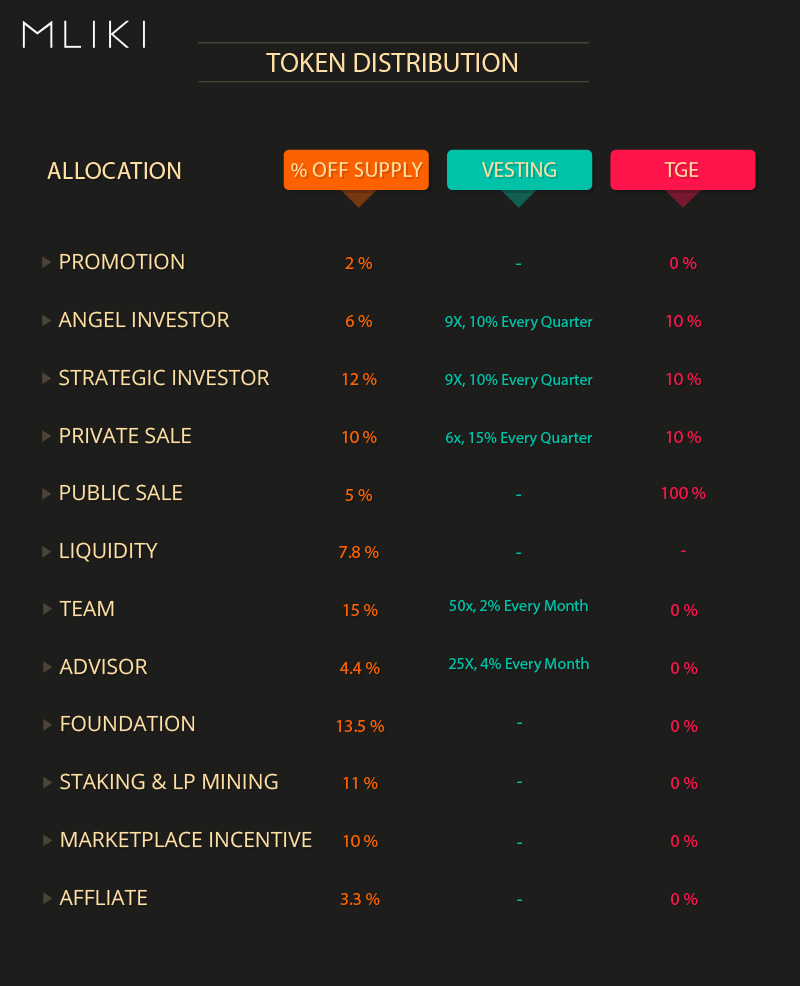
REVENUE STREAMS AND SHARING
With token architecture that applies a 6% tax and redistributed towards holder as well as company treasury wallet,Mliki always ensures development of the ecosystem in parallel with external collaborations with strategic partners and the growth of the community.
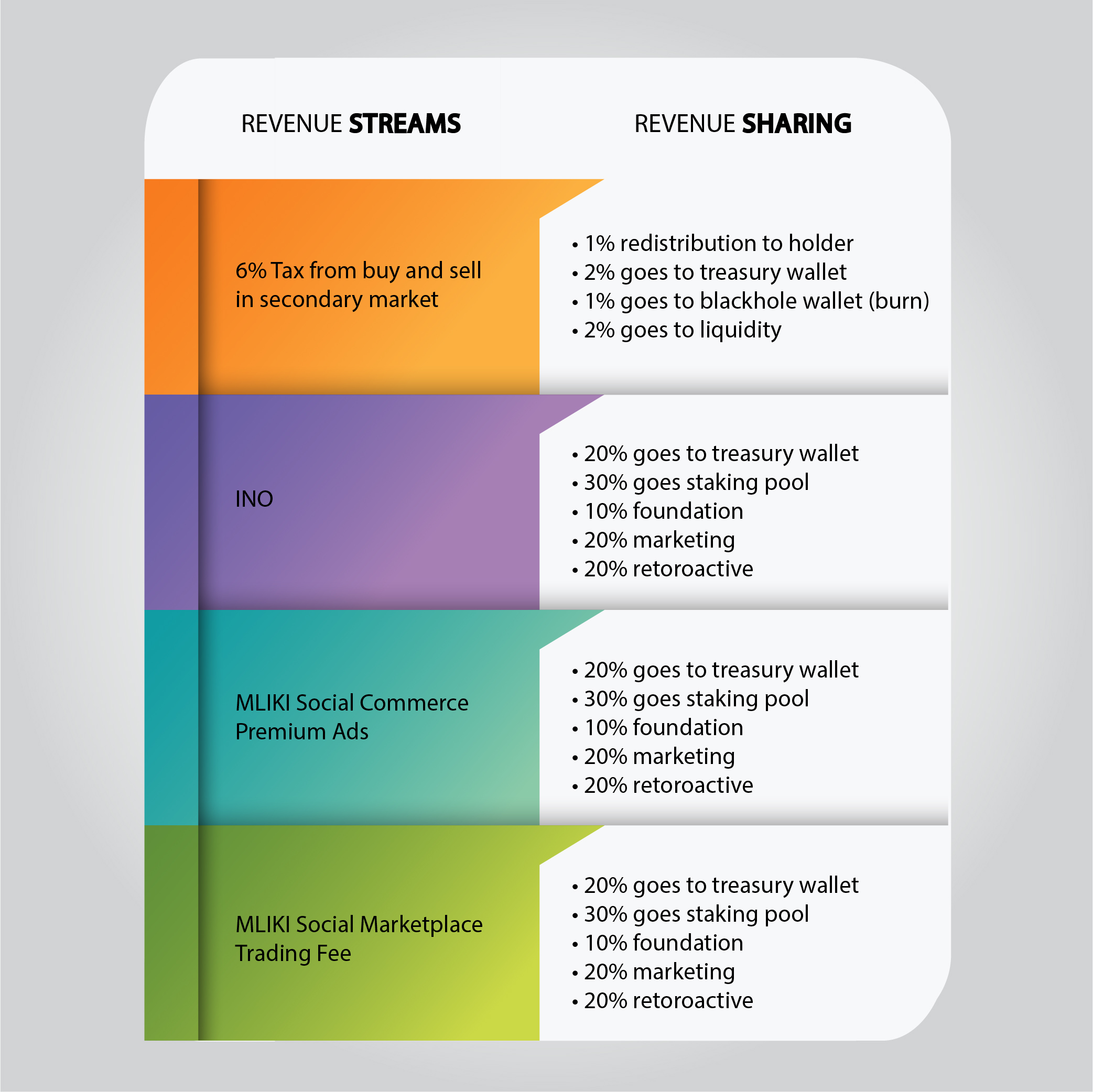
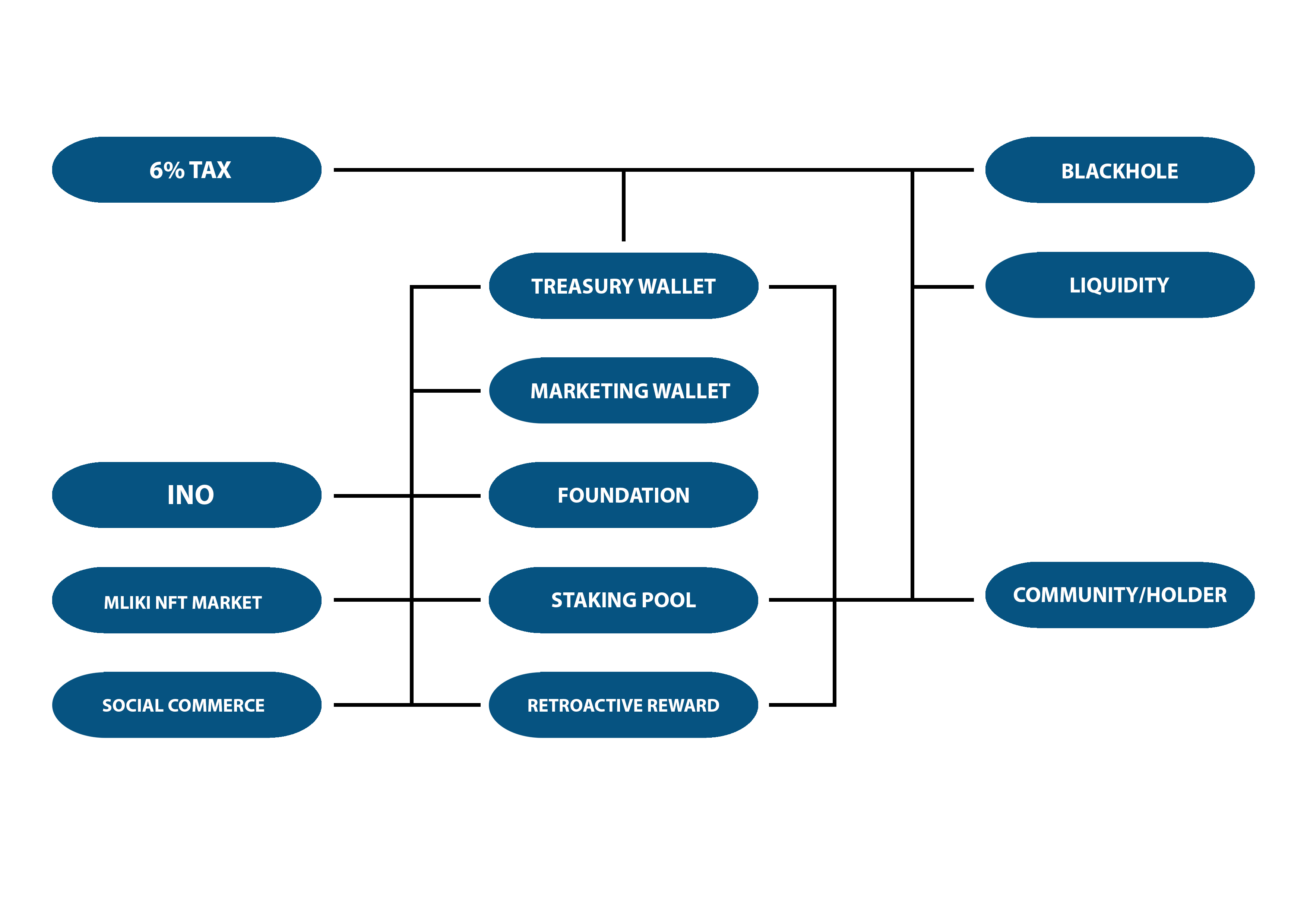
TOKEN USE CASE
The Mliki Token (MLIKI) will supercharge Mliki’s in-experience economy by creating sustainable engagement value for users. Furthermore, the Mliki token will power Mliki’s partner, enabling its participants to capture the value created.
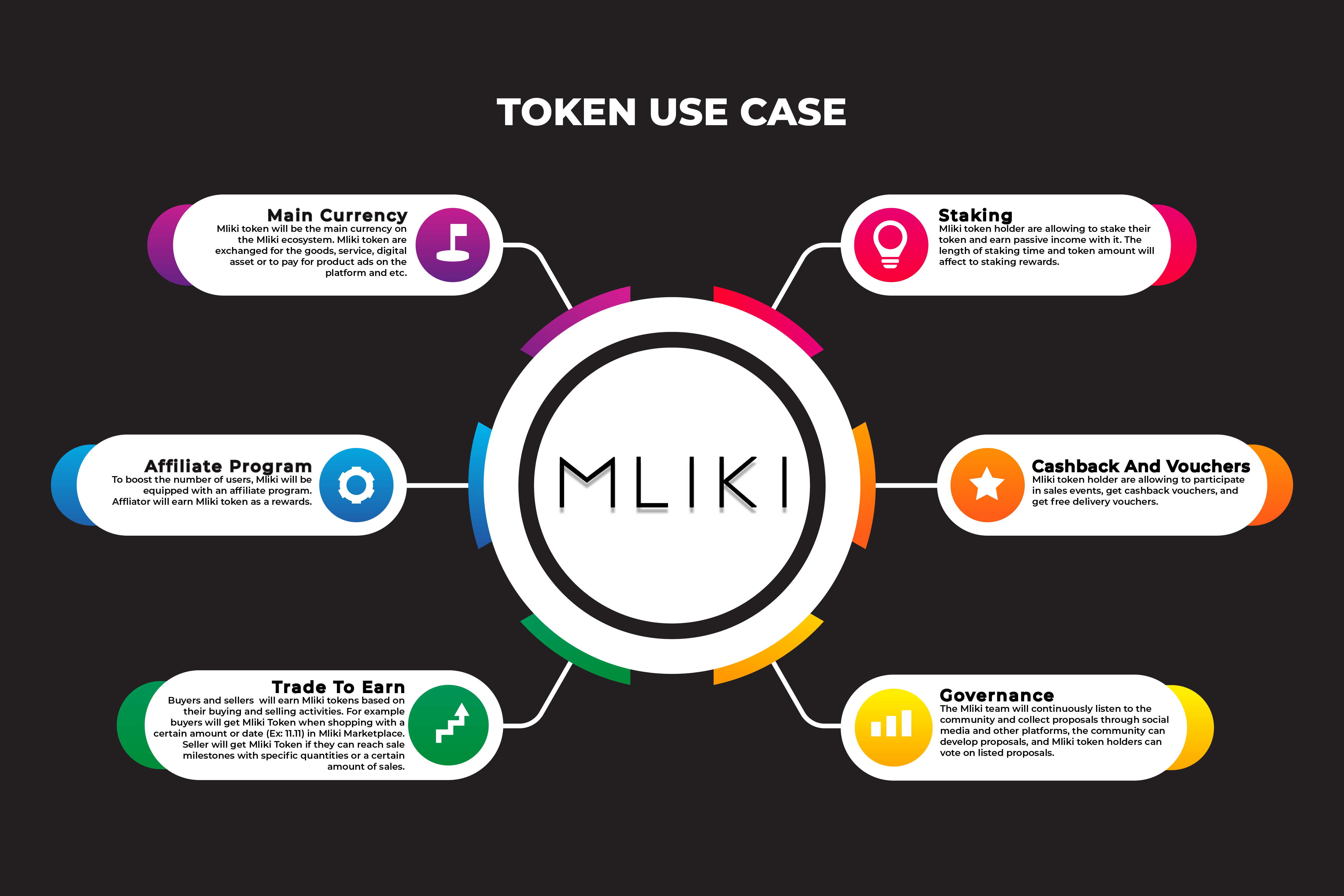
Main Currency
Mliki token will be the main currency on the Mliki ecosystem. Mliki token are exchanged for the goods, service, digital asset or to pay for product ads on the platform and etc.
Cashback And Vouchers
Mliki token holder are allowing to participate in sales events, get cashback vouchers, and get free delivery vouchers.
Affiliate Program
To boost the number of users, Mliki will be equipped with an affiliate program. Affliator will earn Mliki token as a rewards.
Trade To Earn
Buyers and sellers will earn Mliki tokens based on their buying and selling activities. For example buyers will get Mliki Token when shopping with a certain amount or date (Ex: 11.11) in Mliki Marketplace. Seller will get Mliki Token if they can reach sale milestones with specific quantities or a certain amount of sales.
Staking
Mliki token holder are allowing to stake their token and earn passive income with it. The length of staking time and token amount will affect to staking rewards.
Governance
The Mliki team will continuously listen to the community and collect proposals through social media and other platforms, the community can develop proposals, and Mliki token holders can vote on listed proposals.
Information
WEBSITE - WHITEPAPER - TELEGRAM - TWITTER
Author
Forum Username:Lee jhon
Forum Profile Link:https://bitcointalk.org/index.php?action=profile;u=3398617;
Telegram Username:@Leejhon29
Polygon Wallet Address:0x7C39aa3F4ABaEd6A9625C1878237dc575A456f2E
Komentar
Posting Komentar